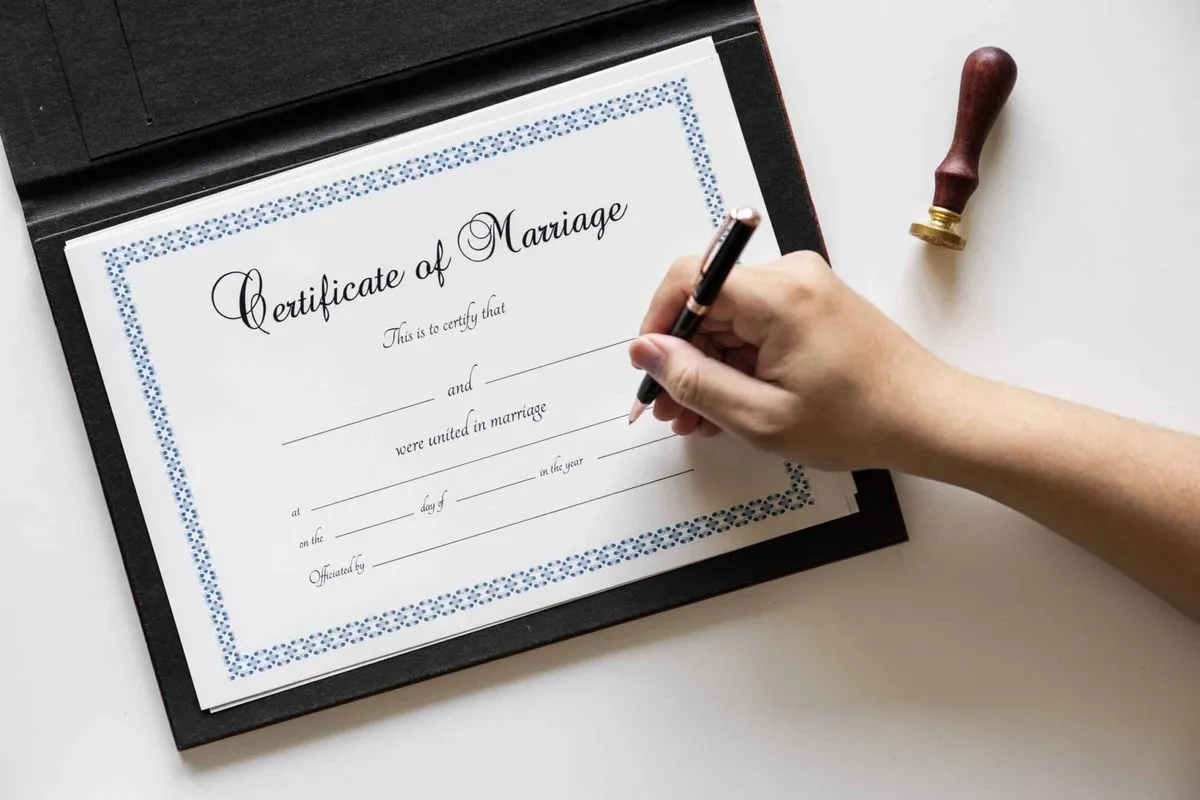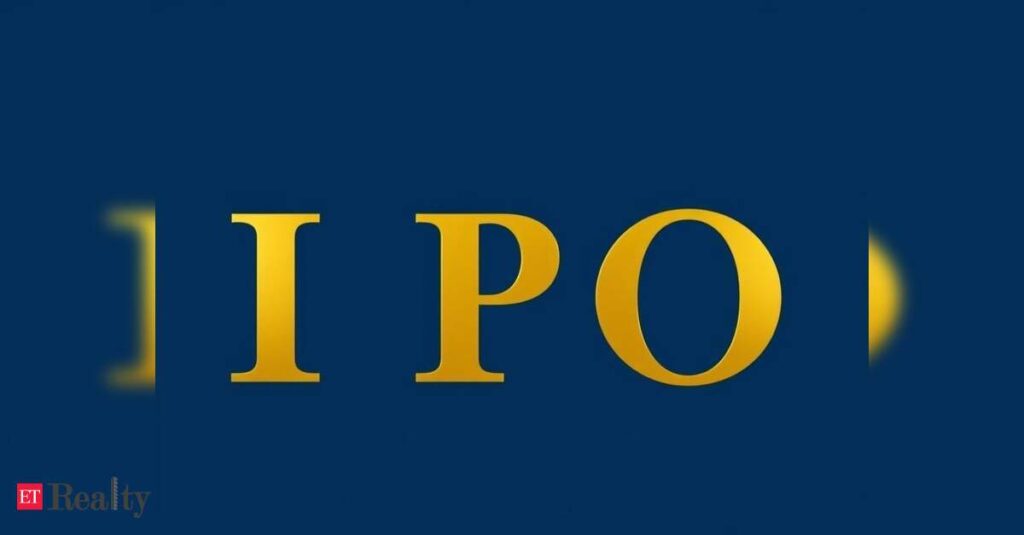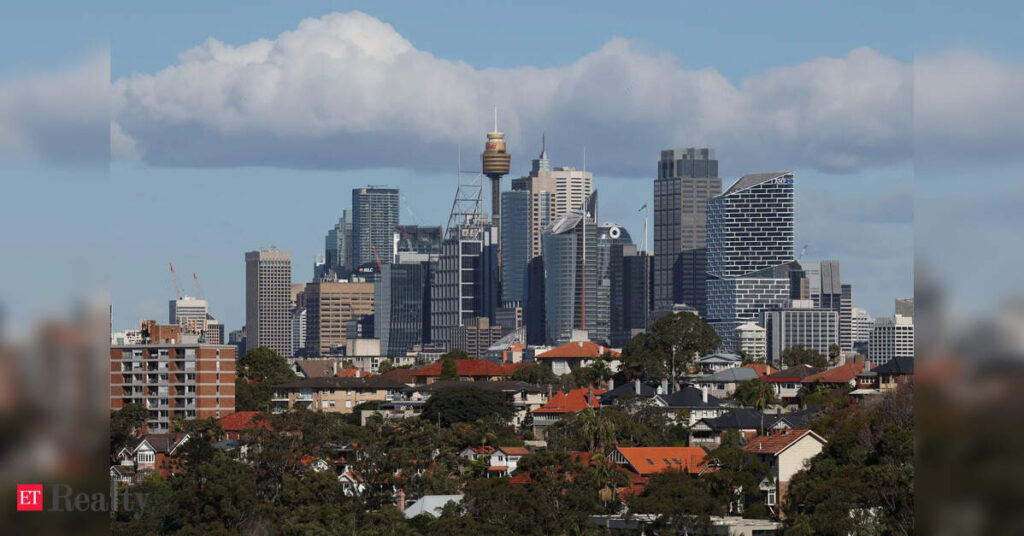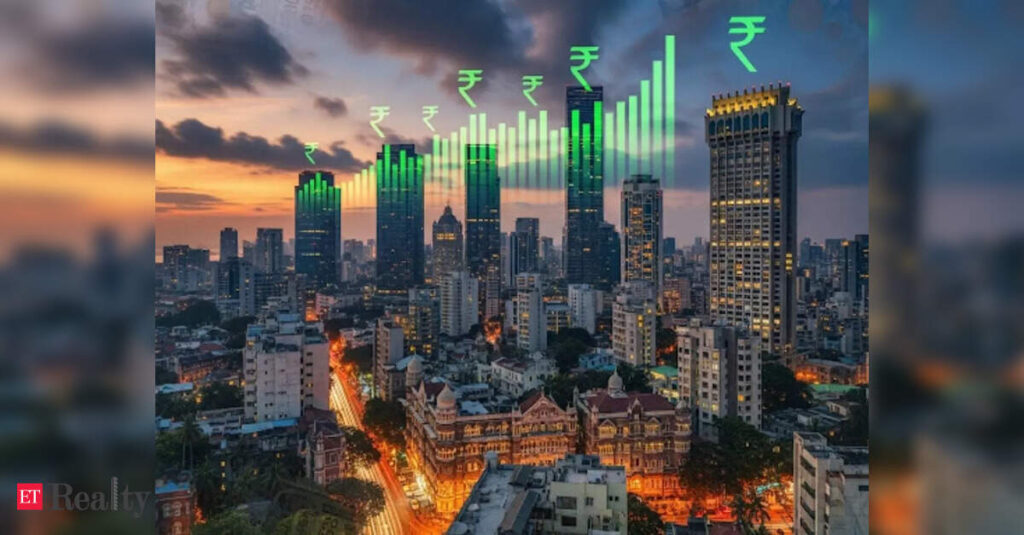Securing a marriage certificate is a crucial step for any newlywed couple. This official document serves as legal proof of your union, recognised by the government and various institutions. Knowing how to get a marriage certificate is essential for navigating many legal and administrative processes after your wedding. This guide will walk you through the entire procedure, from understanding the laws and gathering documents to completing the application, ensuring you can obtain this vital document without any complications.
Marriage Certificate – Quick Information in 2025
Here is a brief overview of the key details involved in obtaining an official marriage certificate in India as of 2025.
| Aspect | Details |
|---|---|
| Issuing Authority | Sub-Divisional Magistrate (SDM) or Marriage Registrar in the jurisdiction where the marriage took place or where either spouse has resided for at least 30 days. |
| Applicable Acts | The Hindu Marriage Act, 1955; The Special Marriage Act, 1954; and other personal laws like the Indian Christian Marriage Act or Muslim Personal Law. |
| Processing Time | Can range from the same day to 30-60 days, depending on the act under which you register and the specific state’s procedures. |
| Approximate Fees | Varies from state to state but typically ranges from ₹100 to ₹200 for standard registration. Special services may incur higher costs. |
| Online Portal | Most states have their own civil registration service portals for marriage certificate online registration. |
Types of Marriage Acts in India
The process for registering a marriage in India is governed by different acts, depending on the religion and preferences of the couple.
Unbeatable Price 5-Star Rated Partner! 2200+ Shades! Top Quality Paint Free Cancellation!

Get a rental agreement with doorstep delivery

Find the BEST deals and get unbelievable DISCOUNTS directly from builders!

5-Star rated painters, premium paints and services at the BEST PRICES!
| Act Name | Applicability |
|---|---|
| Hindu Marriage Act, 1955 | This Act applies when both partners are Hindus, Buddhists, Jains, or Sikhs. It also covers couples where one partner has converted to any of these religions. |
| Special Marriage Act, 1954 | This Act is designed for all citizens, irrespective of their religion. It is the law used for interfaith and inter-caste marriages, as well as for those who prefer a civil union. |
| Muslim Personal Law | Muslim marriages (Nikah) are governed by their laws. While the marriage itself is contractual, registration is recommended for legal validity. |
| Indian Christian Marriage Act, 1872 | This Act governs the marriage solemnisation and registration for couples where one or both partners are Christians. |
Documents Required for Marriage Certificate in India
To begin the process, you must gather a specific set of documents. Both partners must provide self-attested copies of the following documents.
- Application Form: This is the primary document to be filled out and signed by both the husband and wife. Can be obtained from the registrar’s office or downloaded from the state’s official civil registration website.
- Proof of Marriage: You need to provide evidence that the marriage ceremony has taken place. This can be:
- The wedding invitation card.
- A certificate from the priest or religious institution where the marriage was solemnised.
- Photographs of the main wedding rituals, such as the saptapadi or ring exchange.
- Proof of Address for Both Partners: Any one of the following documents is acceptable for each partner. The document should show their current or permanent address.
- Aadhaar Card
- Voter ID Card
- Passport
- Driving License
- Ration Card
- A recent utility bill (electricity, water, or gas) in their name.
- Proof of Age for Both Partners: It is mandatory to prove that both partners have met the legal age for marriage (21 years for the groom and 18 years for the bride). Any one of the following is required:
- Birth Certificate issued by the Municipal Corporation or an equivalent authority.
- Matriculation (Class 10) Certificate that clearly states the date of birth.
- Passport.
- Photographs: You will need recent passport-sized colour photographs. Typically, you need two photographs of the bride, two of the groom, and one photograph of the couple together during the marriage ceremony.
- Witness Documents: Two witnesses who attended the wedding must be present during the registration. They must also provide their documents:
- One passport-sized photograph of each witness.
- Proof of Identity (like an Aadhaar Card or PAN Card) for each witness.
- Proof of Address for each witness.
- Affidavit: In many cases, a joint affidavit from the couple is required. This sworn statement declares the date and place of marriage, their dates of birth, their marital status at the time of marriage, and that they are married according to the applicable customs and laws.
- Divorce Decree or Death Certificate (if applicable): If either partner was previously married, they must provide a certified copy of the divorce decree or the death certificate of the former spouse to prove their current single status.
Procedure for Marriage Certificate Registration
The general procedure for a marriage certificate involves a mix of online and offline steps. Here is a high-level overview of the process.
- Step 1- Notice of Intended Marriage: For marriages under the Special Marriage Act, the couple must first submit a “Notice of Intended Marriage” to the Marriage Registrar.
- Step 2- Public Notice Period: The Registrar publishes this notice for 30 days, during which anyone can object to the marriage. If no valid objection is received, the process continues.
- Step 3- Application Submission: The couple fills out the main application form and attaches all the required documents.
- Step 4- Appointment and Verification: An appointment is scheduled at the Sub-Registrar’s office. On this day, the couple and their witnesses must be physically present.
- Step 5- Document Scrutiny: The Marriage Registrar carefully verifies all original documents against the submitted copies.
- Step 6- Solemnisation and Registration: Once verification is complete, the couple and witnesses sign the marriage register in front of the Registrar.
- Step 7- Issuance of Certificate: After the formalities are completed, the official marriage certificate is issued, often on the same day or within a few days.
How to Get a Marriage Certificate Online (eMarriage Certificate)?
Most Indian states now offer a convenient state-wise online portal to initiate the application process. This helps in reducing paperwork and saves time. Here’s how to get a marriage certificate online.
- Step 1: Visit the local official civil registration or e-district portal of the state or where the marriage was solemnised.
- Step 2: On the website’s homepage, navigate to the section for online services and select “Application for Marriage Registration” or a similar option. You may need to register as a new user to access the application form.
- Step 3: Carefully fill in all the required information in the online form. This will include personal details of the bride and groom (name, father’s name, date of birth, address), details of the marriage (date and place), and information about the witnesses.
- Step 4: The portal will ask you to upload scanned copies of all the necessary documents mentioned earlier. This includes identity proof, address proof, age proof for both partners, witness proofs, and a photograph of the couple. Ensure the documents are clear and in the specified format (usually PDF or JPG).
- Step 5: After filling out the form and uploading documents, you will be directed to a payment gateway. Pay the prescribed fee using a debit card, credit card, or net banking. An acknowledgement receipt with an application reference number will be generated upon successful payment.
- Step 6: The online system will either automatically assign an appointment date or allow you to choose a convenient slot to visit the Sub-Registrar’s office. This appointment is for the final verification of your original documents.
- Step 7: On the scheduled date, both partners and the two witnesses must visit the designated Marriage Registrar’s office. Carry all your original documents and the application acknowledgement receipt. The officer will verify your documents and complete the final registration process. The marriage certificate is usually issued after this final step.
How to Get a Marriage Certificate Offline?
For those who prefer a traditional approach or live in areas with limited internet access, the offline method is always available. Here’s how to apply for a marriage certificate through the offline route.
- Step 1: Visit the Sub-Divisional Magistrate (SDM) or Sub-Registrar’s office in your jurisdiction. This is the area where the marriage took place or where either you or your spouse has lived for more than 30 days. Collect the marriage registration application form from the office.
- Step 2: Complete the application form with all the correct details. Make sure there are no errors or overwriting. Attach self-attested photocopies of all the required documents for the bride, groom, and both witnesses.
- Step 3: Submit the filled form along with all the documents and the required fee to the Registrar’s office. The office clerk will check your application for completeness and provide you with a receipt or an acknowledgement slip.
- Step 4: The office will provide you with a specific date for the appointment. On this day, both partners and the two witnesses must be present at the office.
- Step 5: The Marriage Registrar will verify all your original documents. If everything is in order, you and your witnesses will be asked to sign the official marriage register. Under the Hindu Marriage Act, the certificate may be issued on the same day. Under the Special Marriage Act, this happens after the 30-day notice period.
How to Check Marriage Certificate Status Online?
After applying, you can easily track the progress of your application. Checking your marriage certificate status online is a simple process.
- Step 1: Go back to the same state government portal where you submitted your online application.
- Step 2: Look for a link on the homepage that says “Track Application Status,” “Check Registration Status,” or something similar.
- Step 3: Click on the link and enter the application reference number or acknowledgement number that you received when you submitted your form. You might also need to enter your name or date of marriage for verification.
- Step 4: After submitting the details, the current status of your application will be displayed on the screen. It will show whether your application is pending, under review, approved, or if any further action is required from your side.
How to Download the Marriage Certificate?
Once your application is approved, many states allow you to download a digitally signed e-marriage certificate.
- Step 1- Visit the official civil registration portal of your state.
- Step 2- Navigate to the “Download Certificate” or “Print Certificate” section.
- Step 3- Enter your application number or marriage registration number.
- Step 4- You may need to verify your identity by entering an OTP sent to your registered mobile number.
- Step 5- Once verified, a link to download the marriage certificate in PDF format will appear.
- Step 6- You can save this digital copy and print it for your records. This digitally signed certificate is legally valid.
Marriage Certificate Fees and Timeline
The fees and processing time for a marriage certificate vary across different states and the act under which you register.
| State/Act | Approximate Fees |
|---|---|
| Registration under the Hindu Marriage Act | Typically between ₹100 – ₹150. |
| Registration under Special Marriage Act | Usually between ₹150 – ₹200. |
| Delhi (Tatkal Service) | A special fast-track service is available for approximately ₹10,000, which issues the certificate in a shorter time frame. |
| Other States (e.g., Maharashtra, Karnataka) | Fees generally remain in the ₹100 – ₹250 range for standard processing. |
The timeline for a standard registration is about 15-30 days. For registrations under the Special Marriage Act, the minimum time is 30 days due to the mandatory notice period.
Legal Uses of a Marriage Certificate
A marriage certificate is more than just a piece of paper; it is a key legal document with numerous uses.
- It is essential to apply for a passport or get your spouse’s name added to your existing passport.
- Required by banks for opening a joint bank account or changing your surname in your existing account after marriage.
- Most embassies require a marriage certificate for processing a spouse visa for travel or immigration.
- It serves as crucial proof for claiming insurance benefits, pension, or other assets in the unfortunate event of a spouse’s demise.
- It helps in matters of property inheritance and succession.
- It provides legal security and helps women exercise their rights within the marriage.
When is an Affidavit Required?
An affidavit is a sworn statement made on non-judicial stamp paper and attested by a notary. It is often required during the marriage registration process in the following situations:
- To declare the mental and marital status of both partners.
- To confirm the date of birth and age of the couple.
- To state the intention to marry with free consent.
- If there is a delay in registering the marriage, an affidavit explaining the reason may be required.
AFFIDAVIT FORMAT FOR MARRIAGE CERTIFICATE
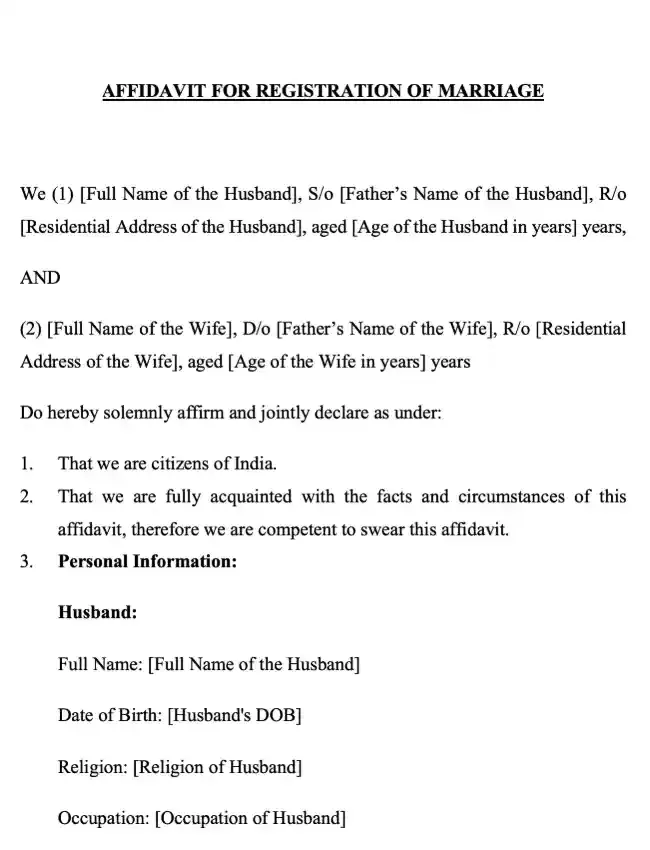
(To be executed on a Non-Judicial Stamp Paper of ₹10 or ₹20 and notarized)
I, [Full Name of Husband], son of [Father’s Name], residing at [Full Address], aged [Age], do hereby solemnly affirm and declare as under:
- That I am legally married to [Full Name of Wife], daughter of [Father’s Name of Wife], residing at [Full Address].
- Our marriage was solemnized on [Date of Marriage] at [Venue/Place of Marriage], as per [Hindu/Muslim/Christian/Other] rites and customs.
- This is our first marriage and neither of us has been previously married (or mention appropriate marital status like widower/widow/divorcee, if applicable).
- We are living together as husband and wife since the date of marriage.
- I am executing this affidavit to apply for the issuance of a marriage certificate from the concerned Marriage Registrar Office.
VERIFICATION
I, the deponent above named, do hereby verify that the contents of this affidavit are true and correct to the best of my knowledge and belief. Nothing material has been concealed therefrom.
Verified at [City] on this [Date].
[Signature of Husband]
Deponent
Note:
- You may need a similar affidavit from the wife as well, depending on local marriage registrar requirements.
- Some states require both parties to sign a joint affidavit.
Latest Updates on Marriage Registration (2025)
In 2025, the government continues to streamline the marriage registration process. The emphasis remains on digital platforms to make applications easier. The Supreme Court of India has consistently highlighted the importance of mandatory marriage registration for all citizens, irrespective of religion, to protect the rights of women and prevent child marriages. The Special Marriage Act, 1954, remains a popular choice for inter-caste and inter-faith couples seeking a secular legal union.
Key Takeaways on Marriage Certificates in India
Obtaining a marriage certificate is a fundamental legal requirement in India. It legitimises your union and provides a host of legal benefits and protections. Whether you choose the marriage certificate online method or the traditional offline procedure, the key is to have all the correct documents ready and follow the steps carefully to ensure a smooth registration experience.
How NoBroker Can Help With Affidavit Services
If the marriage registration process requires you to submit an affidavit, NoBroker can simplify the task for you. Our legal services can assist you in preparing a legally compliant affidavit on the correct stamp paper and getting it notarised, all from the comfort of your home. This ensures your documentation is accurate and saves you from the trouble of finding a lawyer and visiting government offices.
Frequently Asked Questions
Ans: Yes, in 2006, the Supreme Court of India made it mandatory to register all marriages for all citizens, regardless of their religion. This helps protect the rights of both partners, especially women.
Ans: You can apply online by visiting your state’s official civil registration portal. You need to fill out the application form, upload scanned copies of your documents, pay the fee online, and schedule an appointment for final verification at the Registrar’s office.
Ans: For a court marriage under the Special Marriage Act, 1954, you must first file a “Notice of Intended Marriage” with the Marriage Registrar. After a 30-day notice period without objections, you can complete the registration and receive the certificate.
Ans: No, a marriage can only be registered at the Sub-Registrar’s office in the jurisdiction where the marriage was solemnised or in an area where either the husband or wife has resided for at least 30 days before the date of application.
Ans: A notary marriage certificate is simply a declaration on a stamp paper attested by a Notary Public. It has no legal validity as proof of marriage. An official marriage certificate is issued by a government-appointed Marriage Registrar and is the only legally recognised proof of marriage.
Loved what you read? Share it with others!
 Suju,Author
Suju,Author
I’m Suju, an alchemist turned content writer from the enchanting land of Coorg. I love infusing my words with a touch of magic, creating engaging blogs, and informative articles And I have a deep passion for crafting beautiful poems.
Source link

